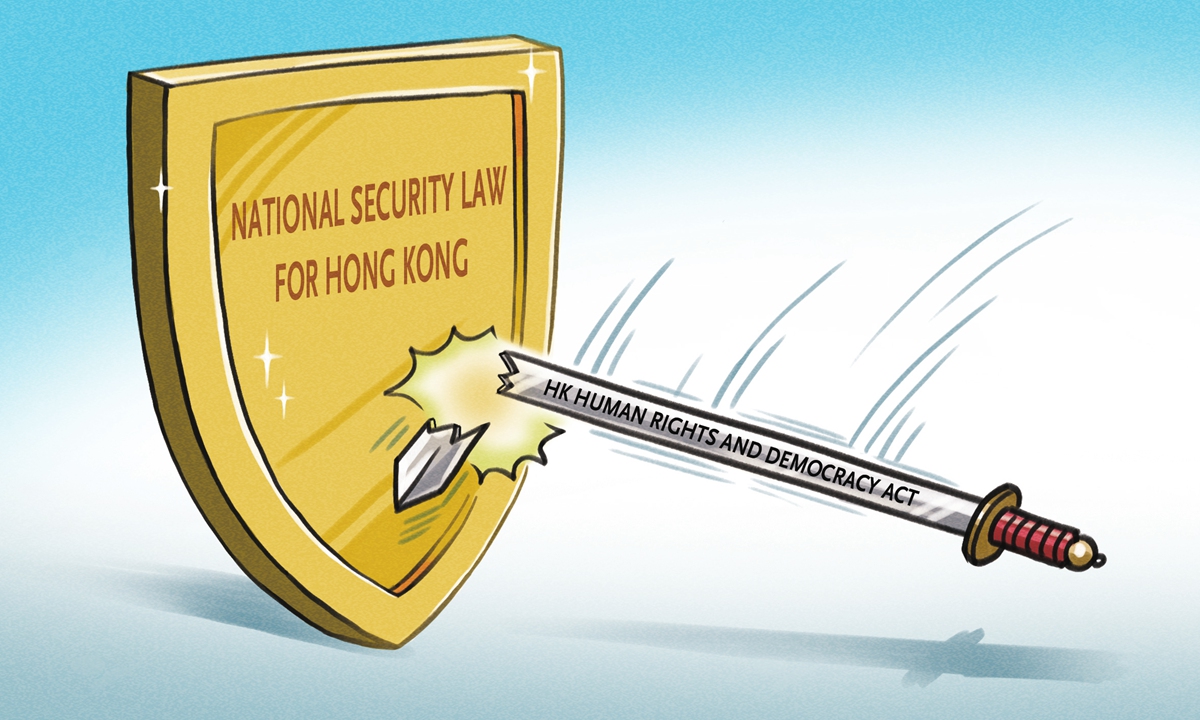China will not tolerate US meddling in domestic HK affairs ever again
Source:Global Times Published: 2020/6/30 18:28:41

Illustration: Liu Rui/GT
Editor's Note:
The National Security Law for Hong Kong was passed by China's top legislature on Tuesday. Steps of revoking US preferential treatment to Hong Kong have started to be taken by the US as a response. What are the US calculations behind the move? How will China react? Where is the major power game between Beijing and Washington headed? Two experts shared their views with Global Times.
Xin Qiang, deputy director of the Center for American Studies at Fudan University in Shanghai
The US move to eliminate Hong Kong's special status serves its own strategic goal - to contain China. Yet China is perfectly justified to safeguard its own national security. It won't flinch if the US continues interfering in China's domestic affairs and threatening China's sovereignty and national interests.
It is not unanticipated that the US would stir up troubles on Hong Kong issue. Washington is simply seizing every opportunity to target Beijing. Apart from Hong Kong, the US has other cards to play including the Taiwan question, the issue of Xinjiang, Tibet, human rights, trade, high technology, etc.
China does not wish to see tensions with the US run too high. But when China has no alternative but to face up the fight, it will not hesitate to take any necessary countermeasures.
China announced on Monday that it will impose visa restrictions on personnel from the US who have behaved badly on Hong Kong-related issues. This is a response to US sanctions. Yet it is a mild one. However, if US anti-China politicians go further, more countermeasures will ensue.
Enacting the national security legislation for Hong Kong is a strong and efficient countermeasure itself. US espionage transpires in either overt or covert ways in Hong Kong, one of the world's intelligence hubs. US intelligence personnel have colluded with figures in Hong Kong's recent unrest. They have jeopardized the city's security and prosperity.
Even though the US is imposing sanctions on Hong Kong, it is well aware that given the city's status of being a special administrative region, with different politics, economics, and legislations from those of the Chinese mainland, Hong Kong is still valuable for the US to utilize. However, with the new national security law, US espionage activities will be restricted there. Relevant personnel will no longer behave as unscrupulously as before. This is already a counterattack toward the US.
The US knows well that the recent move made on Hong Kong will hurt its own interests. But given current US administration's zero-sum mind-set, Washington will carry out whatever measures which it believes will throw a punch to Beijing, US largest long-term rivalry in Washington's belief, no matter how much US interests will be battered during the process.
Su Hao, founding director of the Center for Strategic and Peace Studies at the China Foreign Affairs University
The US move against the new national security law for Hong Kong is expected. After all, it is a place the US really thinks it has an anchor in to contain China.
Defining China as its "competitor" since 2017, the US has spared no effort to crack down on China. The US has imposed sanctions on Hong Kong over the national security law. However, it's only a new excuse for the US to contain China.
The US moves jeopardize the already deteriorating China-US ties. Seeking to strategically confront with China by decoupling in economy and people-to-people exchanges goes against the law of historical development and the general trend of international relations.
Hong Kong will no longer be base for US to infiltrate and interfere in China affairs with the national security law enacted. There will be fewer levers the US can use to contain China.
Vietnam is the one among the few. Washington will ramp up its effort to infiltrate and impact Hanoi and urge this Southeast Asian country to embrace Western values. Then, the US could use Vietnam as an important base to influence China.
The US may offer additional support to Taiwan's secessionist forces in the future, but be cautious not to violate China's red line.
Regardless, the US will try to create a situation where cross-Straits ties are strained, in order to maximize benefits.
In the face of the US repeatedly stirring up cross-Straits relations, China will defend its sovereignty, and adhere to the three China-US joint communiqués. China will criticize and warn any US' attempt to meddle with cross-Straits affairs, and sanction American individuals or corporations who actively bolster Taiwan separatist forces.
Posted in: VIEWPOINT,REPORTER3